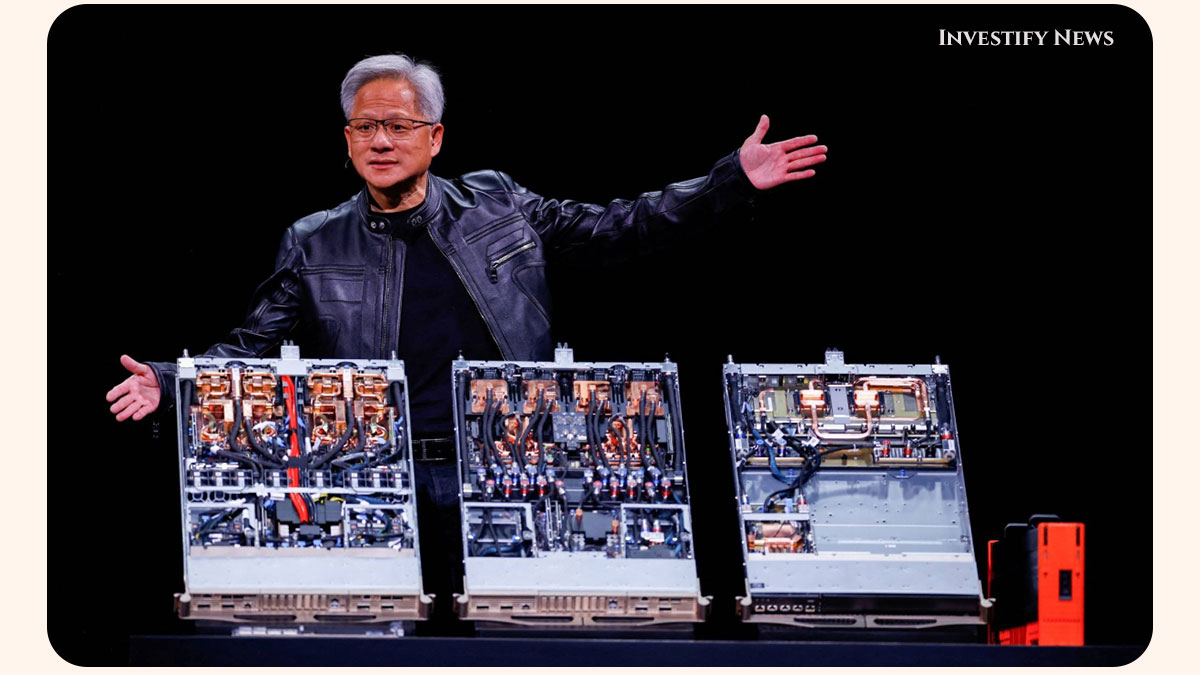At Computex 2025 in Taipei, Nvidia CEO Jensen Huang introduced a wave of transformative technologies to safeguard Nvidia’s dominant position in the global AI chip market. From open-chip collaborations to advanced robotics platforms, Huang’s announcements show how Nvidia is evolving from a chipmaker to a full-fledged AI ecosystem enabler.

1. NVLink Fusion: A New Era of Open AI Hardware
Nvidia’s biggest reveal was NVLink Fusion — a new high-speed chip interconnect system.
Unlike Nvidia’s traditionally closed systems, NVLink Fusion allows Nvidia GPUs to work seamlessly with third-party CPUs and AI accelerators, including those from Qualcomm, Marvell, MediaTek, and Fujitsu.
“We’re opening up our architecture. This is about the future of collaborative, scalable AI systems,” Huang said at the keynote.
This makes Nvidia more attractive to cloud giants and enterprises who want flexibility to build custom AI infrastructure.
2. DGX Spark: Supercomputing Power in a Desktop
2. DGX Spark: Supercomputing Power in a Desktop
Nvidia launched DGX Spark, a compact AI supercomputer for individual developers and smaller research teams.
This palm-sized device is capable of running powerful AI models locally — democratizing access to supercomputing.
Why it matters: Now, researchers, universities, and startups can harness AI processing power without needing a full data center.
Creator: Bloomberg | Credit: Bloomberg via Getty Images
Copyright: © 2024 Bloomberg Finance LP3. Project Groot & Newton Engine: A Leap in Robotics
Nvidia also introduced two key innovations in robotics:
- Project Groot – A next-gen AI platform for humanoid robots, enabling them to learn and respond more naturally.
- Newton Engine – Launching in July 2025, this is a powerful robotics development engine that boosts speed, accuracy, and real-world usability.
According to Cadena SER, Groot and Newton will revolutionize industrial automation, service robots, and healthcare robotics.
4. Major Expansion in Taiwan
Taiwan continues to be a core hub for AI innovation. Huang confirmed:
- A new Nvidia headquarters in Beitou, Taipei
- A partnership with Foxconn’s Big Innovation Company and the Taiwanese government
- Construction of an AI supercomputer using 10,000 Nvidia Blackwell chips
As reported by the Financial Times, this supercomputer will drastically boost AI R&D capacity in the Asia-Pacific region.
Quick Overview: Nvidia’s Major Moves at Computex 2025
| Innovation | Description | Impact |
|---|---|---|
| NVLink Fusion | Open interconnect for third-party chips | Enables flexible AI systems |
| DGX Spark | Compact AI desktop supercomputer | Democratizes AI computing power |
| Project Groot | AI platform for humanoid robots | Enhances robot learning + behavior |
| Newton Engine | Robotics engine for July 2025 | Smarter, more agile robotics |
| Taiwan Expansion | New HQ & 10,000-GPU supercomputer | Boosts regional chip dominance |
Expert Voices
Dr. Radhika Nair, AI Researcher, University of Cambridge:
“Opening up NVLink Fusion to third-party chips shows Nvidia understands the future is in collaborative ecosystems — not just performance.”
Arjun Mehta, Venture Capitalist, Bangalore:
“DGX Spark is game-changing. It’s like putting a slice of a supercomputer in every lab, dorm, or startup office.”
Final Thoughts
Nvidia’s announcements at Computex 2025 weren’t just technical upgrades — they signaled a strategic evolution:
- Openness over isolation
- Accessibility over exclusivity
- Global collaboration over regional silos
As the AI race intensifies, Nvidia is building not just better chips — but a better foundation for every AI-driven future.
Thank you for your sharing. I am worried that I lack creative ideas. It is your article that makes me full of hope. Thank you. But, I have a question, can you help me?
Thank you for your sharing. I am worried that I lack creative ideas. It is your article that makes me full of hope. Thank you. But, I have a question, can you help me? https://accounts.binance.info/ro/register-person?ref=HX1JLA6Z
Can you be more specific about the content of your article? After reading it, I still have some doubts. Hope you can help me.